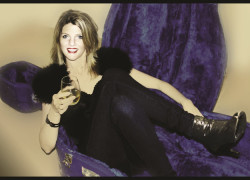
Words by Eliza Janssen
We tend to think of music as a product of the right brain; a creative pursuit that allows us to express our emotions when words fall short. Speaking as both a jazz musician and a speech pathologist, Juliarna Clark is qualified to argue that while we’re convinced we can control music, it in fact controls us. If her Melbourne Fringe Festival cabaret show The Musical Condition is to be believed, an innocent love of music can mutate into a full-fledged affliction, and should be recognised as such.
What is The Musical Condition about?
The premise of it is that I believe, similar to OCD or ADHD or any of those mental health diagnoses, you should be able to diagnose musicality as a condition, if you have enough symptoms. So most of the show is great music. I did a Bachelor of Music in the ‘90s, and I’ve done a variety of styles since then, but in this show I go through the symptoms that musical people exhibit, such as not wanting to be talked to when there’s music on.
There’s varying degrees of irritation to being interrupted; you might be mildly annoyed, moderately disturbed – ‘would you just shut up when there’s music on!’ I’ve got musician friends that need to tap things, tap their teeth, or scrape stuff against a fence as they walk along it. So most of that is in between the songs, this discussion that it should be diagnosable. I think you should be forgiven for certain things, because you can say, ‘sorry, I have the musical condition.’
I reckon the worst thing is when someone takes out one of your earbuds when you’re listening to something so they can talk to you.
Or people who talk at me when bands are on, and bring babies or toddlers in while you’re trying to listen. I went to Bird’s Basement to see a friend, and I hadn’t been before. I thought, ‘Hooray, there’s no more children to annoy me, I can sit by myself’, and just as the lights dimmed, in came someone else from the jazz scene who goes, ‘Can I sit next to you?’ I just wanted to cry.
So you feel like you’re afflicted with this condition?
I think I have a moderate to severe case. There’s also a pathological column in there, though. Have you ever read Oliver Sacks’ book Musicophilia? He describes people who’ve had a stroke, and then to them everything above middle C is sharp, so everything’s out of tune. That’s pathological music interpretation. Moderate to severe is just you can’t live without it. Or someone says a word, and a song comes into your head. It could be a little earworm for half a minute, or it just stays there until you hear another song.
What was the catalyst for the whole project?
I’m a speech pathologist for two days a week, and I do a lot of gigs, so I still have a lot of music friends. I’m used to how they roll. But in a normal workplace, like whenever I hear a computer tone, I sing it back. Or bells going off in a lift. You just have to match the pitch, and I don’t notice I do it. And there are other people who are not affected by music at all. I guess my target audience would have to be music lovers, then. Because I do have family members who just don’t get it, they don’t do music.
Is the show attempting to make those non-musical people more understanding?
No, ‘cause they just don’t feel it. It doesn’t move you if you don’t have at least some of the condition, and you can’t catch it.
It’s innate?
I had to not marry someone because he didn’t have the musical condition, and I did not have the sport condition. Do you know Verdi’s Requiem?
Maybe if I heard it, but not by name.
Oh yeah, everyone would know it. It’s been used in those beer commercials, any huge, epic scene. I sang that with a full orchestra at the Sydney Opera House, and when I came out of it and I asked the boyfriend, ‘What’d you think?’ he answered, ‘Oh, the chairs were really uncomfortable.’ And I thought, ‘We just can’t do this. Wedding’s off.’
You’ve said the show is predominantly music; how does the discussion fit into it?
I didn’t even know it was cabaret. It was an ugly duckling moment. I did perform it in May, and even though I’m a jazz musician, I brought in an Irish song, and other things that I enjoyed. I wanted to able to talk, because most of the time in concerts and jazz festivals, you just sing and play, with maybe a small amount of humour while they fix the microphone. And it was only after [the performance] was over that the drummer said, ‘That was really great cabaret, well done.’ And I thought, ‘Was it?’
Who else is involved in your Melbourne Fringe Festival performance?
It’s got great musicians in it; Steven Grant, he’s a bit of a dark horse, well-known. Do you know CW Stoneking? My husband was bass player for him, and Steve was trumpet player for him. He’s played with everyone. James Clark is on double bass. Joe Roberto is one of our two pianists. Drummer’s Tony Floyd, he’s played a lot of old-school 80’s rock, and Rebecca Harris-Mason is my partner in crime. But I pretty much came up with it myself, purely as an excuse to be able to do whatever I wanted.

